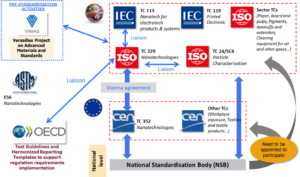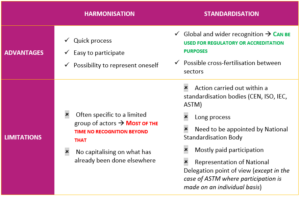
Challenges & Opportunities in the Validation, Harmonisation & Standardisation of industrial-scale Nanofabrication
The NanoFabNet report on ‘Challenges & Opportunities of Validating, Harmonising & Standardising industrial-scale Nanofabrication’ is a seminal review of both the ongoing effort to support emerging technologies, such as nanofabrication, through harmonisation efforts, and the challenges and opportunities of nanofabrication itself.
Based on an in-depth analysis of scientific literature and a large collection of key stakeholder opinions, Laboratoire National de métrologie et d’Essais (LNE) carried out detailed analysis of the challenges and opportunities posed by any validation, harmonisation and standardisation efforts in sustainable nanofabrication. The resulting report provides an overview of the main needs identified together with proposals for action to meet these challenges. The report argues for an increase effort on harmonisation and standardisation in sustainable nanofabrication as ‘the ultimate goal’ that would ensure trust in sustainable nanofabrication processes and products.
As much as nanoscience research can free itself from certain constraints linked to validation and harmonisation issues, the deployment of real scalable sustainable nanomanufacturing cannot do without them. The issues of harmonisation and validation are central to building the conditions of trust between economic actors, but also between economic actors and public authorities/society. To move beyond the demonstrations of one-off nanofabrication, the following three requirements have to be addressed:
- Production must be scalable up to the required throughput and yield,
- The generation, manipulation, and organisation of nanostructures must be accomplished in a precise, controlled, and sustainable manner as demonstrated by full life cycle assessment, and
- All nanotechnology-based products must perform to specification over their expected lifetimes without the release of harmful nanomaterials or other toxic substances into the environment.
From a technical point of view, the development of increasingly complex nano-enabled systems that integrate various nanoscale components developed by a network of complementary players makes the issues of interoperability between components, but also between nanofabrication equipment and platforms, critical. This complexity can only be addressed by harmonising and validating several key points, in order to ultimately provide trust between economic actors in the value chains. These conditions are indeed essential to produce objective and documented information and evidence that nanomanufacturing processes lead to components and products with the expected performances, thus contributing to reduce costs by lowering reject rates. But the implementation of high quality processes is inseparable from the existence of validated measurement technologies that can be used via harmonised and reliable protocols to produce comparable and reliable data.
From the point of view of sustainability, the same questions arise regarding harmonisation and validation of the necessary tools and methodologies that enable the safe generation and handling of nanostructures; this is also true with regard to the nano-specific regulatory requirements that may exist depending on the applications considered, the life cycle impact of the nano-systems and the ethical concerns that must also be taken into account, in order to allow for the establishment of the confidence necessary for the acceptability of these new technologies and processes.
The Community of sustainable Nanofabrication recognises the Need for Harmonisation and Standardisation
In a recent NanoFabNet survey[1] conducted by Work Package 4 (WP4), 90% of respondents thought that harmonisation and standardisation of nanofabrication processes could help to bring maturity to nanofabrication methods and thus improve product quality, while saving time, a finding confirmed once again during the 2nd NanoFabNet Development Workshop (DW), held on the 20th-21st January 2021.
The report provides an overview of the various bodies that have been put in place to support harmonisation and standardisation of nanotechnologies on regional and global levels and explains the difference between harmonisation and standardisation.


After identifying and discussing the challenges and opportunities of harmonisation and standardisations for all aspects pertaining to sustainable nanofabrication, ranging from materials production to scaling processes, to measurement technologies, issues of EHS (environmental, health and safety) and LCS (Life Cycle Sustainability), as well as ethics and governance, the report concludes that it is of utmost importance to better connect the communities of sustainability, nanofabrication with those of validation, harmonisation and standardisation; the following initiatives have been proposed to support this connection:
- increase the visibility of key initiatives such as VAMAS in order to validate characterisation technologies and associated methodologies for the most urgent needs;
- set up a dedicated and funded inter-laboratory program to be backed by the CEN/TC 352;
- organise proficiency tests in a coordinated manner on topic (material, property, technique) identified as a priority to support accreditation of laboratory according to ISO/IEC 17025 standard;
- promote readily available standards and reference documents, by providing an overview of existing documents and work in progress, while highlighting success stories that show the key role of standardisation in innovations based on nanomaterials and nanodevices;
- creation of a centralised website containing links to existing lists of international standards and best practice to allow consolidating the information in a single location, as already pointed out at GSRS16[2]; and
- Raise awareness about ethical approaches and tools available.
NanoFabNet is now working on establishing a central repository for documents that are relevant to the abovementioned communities, whose stakeholders will be subsequently invited to join the NanoFabNet Hub and thus contribute to the establishment of a collaborative ecosystem for sustainable nanofabrication.
[1] GSRS16 = Global Summit on Regulatory Science – Nanotechnology Standards and Applications, September 7-9, 2016, Maryland, USA.
[2] NanoFabNet WP4 Survey on Validation, Harmonisation and Standardisation issues: September 2020 – February 2021.
Full document: Challenges & Opportunities in the Validation, Harmonisation & Standardisation of industrial-scale Nanofabrication
Written by: Georges Favre (LNE) and Steffi Friedrichs (AcumenIST)

